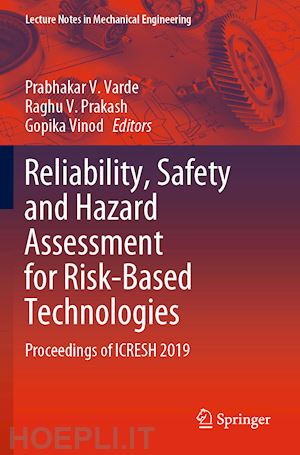
Questo prodotto usufruisce delle SPEDIZIONI GRATIS
selezionando l'opzione Corriere Veloce in fase di ordine.
Pagabile anche con Carta della cultura giovani e del merito, 18App Bonus Cultura e Carta del Docente
This volume presents selected papers from the International Conference on Reliability, Safety, and Hazard. It presents the latest developments in reliability engineering and probabilistic safety assessment, and brings together contributions from a diverse international community and covers all aspects of safety, reliability, and hazard assessment across a host of interdisciplinary applications. This book will be of interest to researchers in both academia and the industry.
Prof. Prabhakar V. Varde is an expert in the field of application of reliability and probabilistic risk assessment to nuclear plants and is currently working as Head of the Research Reactor Services Division and Senior Professor at Homi Bhabha National Institute, Bhabha Atomic Research Centre, Mumbai, India, where he also serves in advisory and administrative capacities in Atomic Energy Regulatory Board (AERB), India, and the Homi Bhabha National Institute, India. He is the Founder and President of the Society for Reliability and Safety (SRESA) and is one of the chief editors for its international journal—Life Cycle Reliability and Safety Engineering. He completed his B.E. (Mech) from Government Engineering College, Rewa, in 1983 and joined BARC, Mumbai, in 1984, where he worked as a Shift Engineer in the Reactor Operations Division until 1995. In 1996, he received his Ph.D. in Reliability Engineering from the Indian Institute of Technology, Bombay, Mumbai, following which he worked as a Postdoctoral Fellow at the Korea Atomic Energy Research Institute, South Korea, and a Visiting Professor at the Center for Advanced Life Cycle Engineering (CALCE) at the University of Maryland, USA. Professor Varde is also a consultant/specialist/Indian expert for many international organizations, including OECD/NEA (WGRISK), Paris; International Atomic Energy Agency, Vienna; University of Maryland, USA; Korea Atomic Energy Research Institute, South Korea. Based on his R & D work, he has published over 200 publications in journals and conferences, including 11 conference proceedings books.
Prof. Raghu V. Prakash is a Professor in the Department of Mechanical Engineering, Indian Institute of Technology Madras (IIT Madras) where he specializes in new product design and the assessment of structural integrity and remaining life prediction of critical components used in transportation and energy sectors. He has more than twenty five years of professional experience in the field of fatigue and fracture and has published more than 100 scientific articles in books and journals, more than 100 conference publications and has edited 4 book volumes. He has developed test systems for use in academia, R&D and industry during his tenure as Technical Director at BiSS Research, Bangalore; at IIT Madras, he teaches courses relating to Fracture Mechanics, Design with Advanced Materials, Product Design, DFMA. He is a voting rights member of ASTM International (Technical Committees, D-30, E-08 and E-28), current Chair of the Materials Processing Technical Committee of the Materials Division of ASME, Chair of Technical committee (Mechanical, Aerospace) of InSIS and Chair of the Chennai Chapter of Society for Failure Analysis. He serves in the Editorial boards of Journal of Structural Longevity, Frattura ed Integrità Strutturale (IGF Journal of Fracture and Structural Integrity), Journal of Life Cycle Reliability and Safety Engineering. Prof Prakashreceived his Bachelor’s degree in Mechanical Engineering from College of Engineering, Guindy, Madras (now Chennai); Master’s degree (by Research) and Ph.D. from the Department of Mechanical Engineering, Indian Institute of Science Bangalore. He is a member of several technical societies (including the Indian Structural Integrity Society, Society for Failure Analysis and Indian Institute of Metals) and has won several prestigious awards (Binani Gold Medal of the Indian Institute of Metals), scholarships and Erasmus-Mundus Fellowships. He is the recipient of Distinguished Fellow of the International Conference on Computational and Experimental Engineering and Sciences (ICCES) 2015.
Dr Gopika Vinod is a faculty member and the Head of the Probabilistic Safety Section in Bhabha Atomic Research Centre, Mumbai, India. She received her PhD in Reliability Engineering from Indian Institute of Technology, Bombay, after which she has worked as a post-doctoral fellow at the Steinbies Advanced Risk Technologies, Germany and as a visiting scientist at Brookhaven National Laboratory. She was a recipient of the DAE Young Engineer Award in 2007 and has been actively involved in reliability, safety and risk analysis of Indian nuclear power plants, and nuclear and chemical facilities. She has worked on the development of reliability based operator support systems such as risk monitors and symptom based diagnostic systems for Indian nuclear power plants. Her other areas of research activities include risk informed in-service inspection, reliability of computer based systems, dynamic reliability analysis, human reliability analysis, etc. She is in the editorial board of international Journal of System Assurance Engineering and Management, and the Journal of Life Cycle Reliability and Safety Engineering. She also serves as Journal Referee to IEEE Transactions on Reliability, Reliability Engineering and System Safety, Risk Analysis,Ann











Il sito utilizza cookie ed altri strumenti di tracciamento che raccolgono informazioni dal dispositivo dell’utente. Oltre ai cookie tecnici ed analitici aggregati, strettamente necessari per il funzionamento di questo sito web, previo consenso dell’utente possono essere installati cookie di profilazione e marketing e cookie dei social media. Cliccando su “Accetto tutti i cookie” saranno attivate tutte le categorie di cookie. Per accettare solo deterninate categorie di cookie, cliccare invece su “Impostazioni cookie”. Chiudendo il banner o continuando a navigare saranno installati solo cookie tecnici. Per maggiori dettagli, consultare la Cookie Policy.